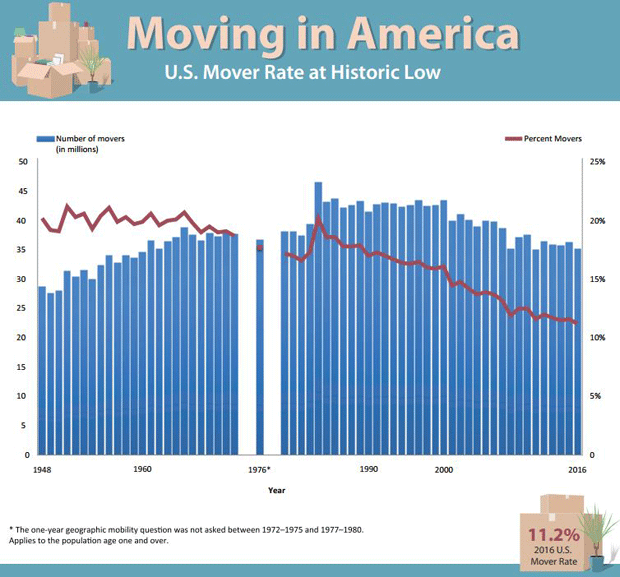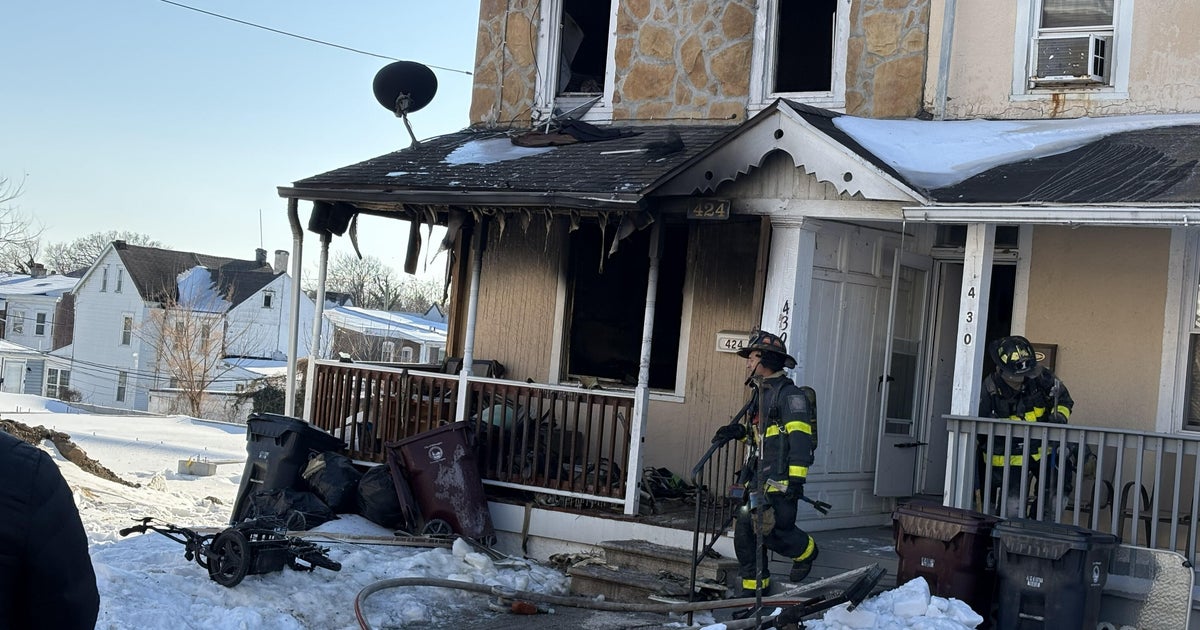Staying put: Why Americans aren’t moving
The latest U.S. Census report echoes Dorothy’s last line in the “The Wizard of Oz”: “There’s no place like home.” Fewer and fewer of us, it seems, are moving less and less. And that migratory slowdown within the 50 states has been steadily declining for more than 40 years.
This preference for staying put is at odds with the country’s historical narrative of Americans striking out in search of opportunity wherever it may lie. It’s also making sociologists and economists scratch their heads. But there’s no denying that it’s happening: The percentage of people who moved in a one-year period fell to an all-time low of 11.2 percent in 2016, according to Census data (see chart below.)
There was a time when we moved often. The first intensive migration was westward ho in the 1800s, and again during the Great Depression when the “Okies” fled to California. Then as industry moved from north to south in the ‘50s and ‘60s, so did many workers.
Now, there’s a lot less happening -- or not happening. Does that stem mostly from the recession, which left no corner of the U.S. untouched? Some would say no, pointing out that the epic downturn that followed the housing crash started in 2008, while the decrease in the percentage of people who move has been decreasing since the 1970s.
“The latest figures don’t reflect a further decline in economic dynamism,” said Jed Kolko, chief economist with online job site Indeed.com. “Job-related moves have held steady and even increased since the worst of the recession.” Kolko defined job-related moves as cross-state moves among adults between the ages of 25 and 54.
Yet that dynamism, even if it hasn’t declined following the recession, may not be what it used to be. In fact, a relatively small number – 20.2 percent, say they are moving for a better job or employment opportunity, while 27.4 percent said their moves were family-related. The largest number, 42.2 percent, moved for housing-related reasons, such as an upgraded home or apartment.
Many people simply wanted a better place to live, and it doesn’t have to be far away. For example, urban Los Angeles has seen big exodus of people this year to nearby Orange and San Bernardino counties. Others, likely older people, moved to warmer climates, such as from New York to Florida, or to lower taxes, such as from California to Texas.
But the economy is definitely a factor in slowing down migration, just as it was in the recent election, where economic growth was significantly lower in the swing states that voted for Trump than the nationwide average, according to the Atlantic Council.
“There is less dynamism in the economy,” said Chief Economist Lawrence Yun of the National Association of Realtors (NAR). A current NAR survey asked recent home sellers how long they’ve lived in their current home. In 2016 it was 10 years. In previous surveys it had been only seven years, he said.
That suggests the housing market slump is still with us, Yun said. People who bought in the early part of the century and overpaid now can’t get out. Four to 5 million homes are “underwater” -- that is, people owe more on their properties than they are worth. “This underwater situation is unique in U.S. history,’ he said.
And it carries over to banks, which have tightened mortgage-lending requirements to the point where it’s difficult for small business owners, or self-employed workers like Uber drivers, to take out loans because they can’t show a steady stream of income on their W-2’s.
With fewer homes on the market, prospective sellers are worried that they won’t be able to afford an equivalent home if they sell, Yun said. That, too, keeps people in place.
A recent study by the National Bureau of Economic Research (NBER) on migration echoes the Census data suggesting that Americans are staying closer to home. “We found that interstate migration had declined by 25 to 50 percent, depending on the data source,” said Abigail Wozniak, one of the authors of the study and an economist as the University of Notre Dame.
But the authors venture another theory for what might be discouraging people from moving. Wozniak said workers may not be getting better options from new employers as often as they were in the past, and that might lead them to stay put for longer, both in their jobs and in their location.
So why aren’t job offers -- particularly the ones coming from the other side of the country -- not as good? One reason might be that “relocation benefits” which would allow an interstate move, are either skimpy or non-existent.
“In 2015 the number of job postings that explicitly stated ‘relocation provided’ decreased by 4 percent, according to online job-site Monster.com. The top industries still offering such financial assistance were public administration, health care, finance and insurance. Health diagnosing and treating practitioners were in particularly high demand.
According to Monster’s Multi-Generational Survey, the younger the worker, the more likely they are to move, while only about half of older workers would do so.
There are many different reasons why people might like to stay where they’re at, said headhunter Vicki Salemi, who has 15 years experience in human resources and is a “career expert” with Monster.
One is that companies these days can often afford to be picky. “I haven’t seen many employers sweeten the deal with relocation money, and they often want someone who can start now, not in two months,” she said. Salemi now tells prospective job seekers to take their current address off their resume if they live in another state.
Other reasons employment experts suggested may explain why Americans are moving less:
- Job “lock” -- the fear of losing benefits or vacation, particularly in an era of rising health care costs.
- Flexibility -- in many cases the applicant no longer has to work in an office, particularly when as a “hybrid” multi-skilled employee he or she may be able to work from home or a location near home. Many companies offer multiple job sites connected by a keystroke.
- Dual family incomes where one partner is unwilling to leave their current employer.
- Millennials who live with their parents and are not ready to move without a substantial bump in salary.
One might think that the advent of social networking would make it easier to find another job. But many good jobs result instead from close friends or relatives who see openings in their own companies and are willing to give a recommendation, experts said.
Sociologist Mark Granovetter of Stanford University has said that social networks often provide “weak ties” with a lot of people who may -- or may not -- be willing to help and where trust is at a minimum. How many people will trust their future to someone they don’t really know?
So is the great migration for jobs and a better future over, or has it just gone online?
“All we really have are hunches,” said Indeed’s Kolko. He’s lived in the same place -- San Francisco -- for 15 years and has “no plans to move.”




